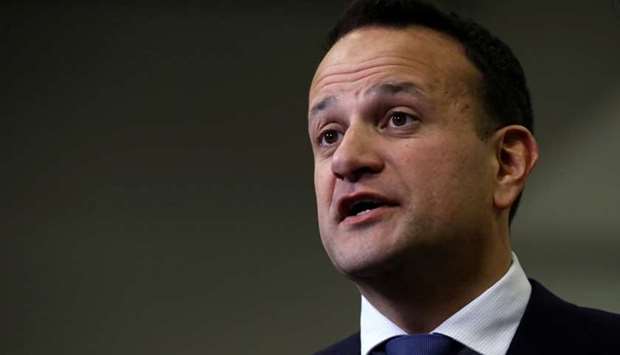* Irish nationalists Sinn Fein won most votes at election
* Irish PM says onus now on Sinn Fein and Fianna Fail* Varadkar willing to consider coalition if Sinn Fein fail
* Smaller Labour Party says will not enter government
Irish Prime Minister Leo Varadkar said on Wednesday it was likely he would be the next leader of the opposition after government formation talks but that his Fine Gael party would be willing to help form a government if Sinn Fein fails to.
Left-wing Irish nationalists Sinn Fein surprisingly secured the most votes in the weekend election, but its low number of candidates meant it finished marginally behind the centre-right Fianna Fail and just ahead of Fine Gael by number of seats.
Sinn Fein leader Mary Lou McDonald said her party "won the election" and would try to form a leftist-led government with smaller parties and independent lawmakers, though that task appeared much harder after the Labour Party said it would not join.
"We were defeated in this election, there is no point in trying to dress that up in any way. It may have been a tight finish but that means people are saying to us that Fine Gael should go into opposition and we are absolutely willing to do that," Varadkar told reporters.
"In terms of what may happen later on in the process, in the next couple of weeks, we are the party that founded the state and if we are needed to give the country political stability and good governance, then we are willing to talk to other parties. But in the first instance, the onus is on Sinn Fein."
Ireland's Labour Party, which won six seats in the 160-seat parliament, said on Wednesday it would not be a member of the next government, virtually ending any hope Sinn Fein had of governing without the help of Fine Gael or Fianna Fail.
Announcing he would step down as Labour leader, Brendan Howlin said his party remained open to the idea of supporting a government but from the opposition benches.
Fine Gael has strongly ruled out governing with Sinn Fein, citing policy differences and the nationalist party's role as the former political wing of the Irish Republican Army (IRA).
Fianna Fail insisted it would not enter government with either party during the campaign, although its leader declined to repeat earlier outright refusals to consider Sinn Fein.
There are open divisions over a tie-up among Fianna Fail lawmakers, who won 38 seats to Sinn Fein's 37 and Fine Gael's 35. The party's justice spokesman has said he would not serve in a Fianna Fail/Sinn Fein government.
Varadkar said it was up to Sinn Fein to form a government with left-wing parties or Fianna Fail and that he had not spoken to Fianna Fail leader Micheal Martin yet about an alternative.
Varadkar was speaking after a major international banking conference in Dublin at which he said he wanted to offer "some reassurance" that Ireland was still a good country to do business in.
Paraphrasing Irish poet W.B. Yeats, Varadkar told the European Financial Forum that a "dark future" had not yet come to pass in Ireland and that there was an obligation on all to deliver political stability.
He told reporters that any sharp leftward shift in business and trade policy would "cause investors to reconsider that Ireland is a warm place for them".
"The consequence of that would be a weaker economy... I don't think that has yet come to pass but it is a risk," he said.

